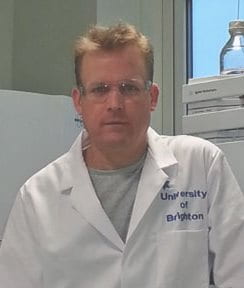Our team
 A marine biologist, Corina’s expertise is in functional ecotoxicology, focusing on biological responses of marine organisms to environmental stressors. Prior to working at the University of Brighton, Corina was a full-time Research Fellow at the University of Sussex in the Aquatic Toxicology group. She was involved in a wide range of international research programmes, looking at detoxification mechanisms in marine invertebrates and their use as biomarkers, induction of DNA damage in critical growth regulating genes and impairment of sex determination/differentiation mechanisms in marine bivalves.
A marine biologist, Corina’s expertise is in functional ecotoxicology, focusing on biological responses of marine organisms to environmental stressors. Prior to working at the University of Brighton, Corina was a full-time Research Fellow at the University of Sussex in the Aquatic Toxicology group. She was involved in a wide range of international research programmes, looking at detoxification mechanisms in marine invertebrates and their use as biomarkers, induction of DNA damage in critical growth regulating genes and impairment of sex determination/differentiation mechanisms in marine bivalves.
 Dr. Bucca has been involved in several research projects where the major contribution was transcriptomic analysis of human sleep and human nutrition. More recently she has developed expertise in RNA-seq and ribosome profiling (Ribo-seq) using the Illumina NextSeq 500 platform. Her main research focus is however understanding the contribution of translational gene regulation in response to stress and in controlling antibiotic production in Streptomyces bacteria.
Dr. Bucca has been involved in several research projects where the major contribution was transcriptomic analysis of human sleep and human nutrition. More recently she has developed expertise in RNA-seq and ribosome profiling (Ribo-seq) using the Illumina NextSeq 500 platform. Her main research focus is however understanding the contribution of translational gene regulation in response to stress and in controlling antibiotic production in Streptomyces bacteria.
Dr Andrew Hesketh
 Andrew enjoys investigating and trying to understand biological systems and processes through the analysis and interpretation of genome-wide –omics data sets.
Andrew enjoys investigating and trying to understand biological systems and processes through the analysis and interpretation of genome-wide –omics data sets.
This has grown out of a long-standing interest in studying the regulation of metabolism in microorganisms with biotechnological applications (yeast and streptomycetes), and the analysis of bacterial antibiotic resistance, and has involved a transition from full-time wet-lab research to full-time computational biology work. His current research involves studies ranging from the analysis of bacterial systems through to data derived from human cells.
 Dr. Stewart’s research recently focused on non-enzymatic chemical modifications of proteins by reactive metabolites, for example catecholamines and catechol oestrogen metabolites and their implications in diseases, such as neurodegenerative diseases, diabetes and cancer. He is also interested in applying nano LC-MS/MS for the identification of novel post-translational modification of proteins and developing on-line methods for the enrichment of modified peptides in proteomics.
Dr. Stewart’s research recently focused on non-enzymatic chemical modifications of proteins by reactive metabolites, for example catecholamines and catechol oestrogen metabolites and their implications in diseases, such as neurodegenerative diseases, diabetes and cancer. He is also interested in applying nano LC-MS/MS for the identification of novel post-translational modification of proteins and developing on-line methods for the enrichment of modified peptides in proteomics.
 Dr. Koagouw has been involved in several international collaborative projects in marine monitoring and protection during her time at the Indonesian Institute of Sciences, the governmental authority for science and research in Indonesia. Her most recent research investigated the impact of metformin and temperature as multiple stressors on the reproduction of blue mussels and the occurrence, direct impact and potential ecotoxicological effects of paracetamol and metformin on Mytilus edulis. She is now particularly interested in ecotoxicology, endocrine disrupting compounds, emerging pollutants, marine pollution, and marine ecosystems in general.
Dr. Koagouw has been involved in several international collaborative projects in marine monitoring and protection during her time at the Indonesian Institute of Sciences, the governmental authority for science and research in Indonesia. Her most recent research investigated the impact of metformin and temperature as multiple stressors on the reproduction of blue mussels and the occurrence, direct impact and potential ecotoxicological effects of paracetamol and metformin on Mytilus edulis. She is now particularly interested in ecotoxicology, endocrine disrupting compounds, emerging pollutants, marine pollution, and marine ecosystems in general.
Dr Nicolette Fox – Development Manager, Community University Partnership Programme.
 I love my work at CUPP – the University of Brighton’s pioneering Community University Partnership Programme. One of my recent projects was designing and developing the fast track Ignite programme to initiate a suite of community-university knowledge partnerships. While I have an academic background, much of my career has been working on sustainabilty communications and engagement projects. Over the years, I have been fortuante to have won numerous awards for my work including WWF’s Environmental Campaign of the Year and WWF Environmental Website of the Year. A guiding thread woven throughout my career is the importance of sharing stories to inspire, engage and educate.
I love my work at CUPP – the University of Brighton’s pioneering Community University Partnership Programme. One of my recent projects was designing and developing the fast track Ignite programme to initiate a suite of community-university knowledge partnerships. While I have an academic background, much of my career has been working on sustainabilty communications and engagement projects. Over the years, I have been fortuante to have won numerous awards for my work including WWF’s Environmental Campaign of the Year and WWF Environmental Website of the Year. A guiding thread woven throughout my career is the importance of sharing stories to inspire, engage and educate.